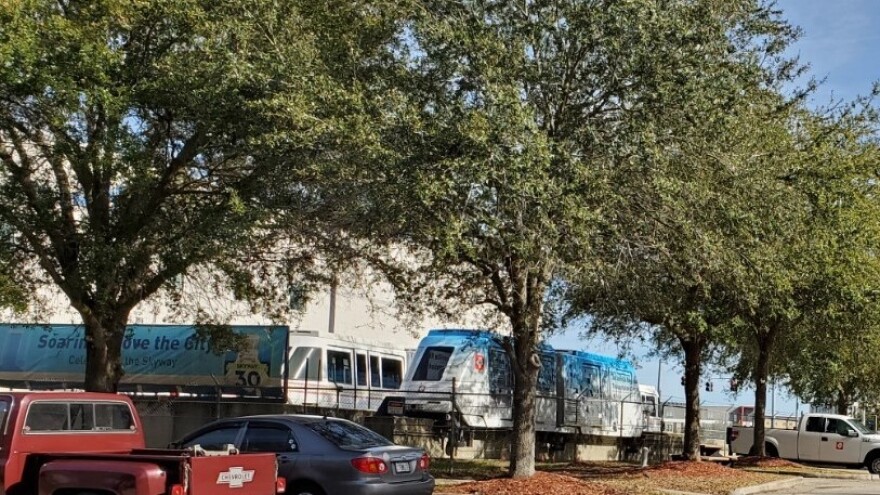Plans to open a Skyway monorail station in Brooklyn have fallen behind schedule due to the pandemic.
“The project is still happening. It was delayed by COVID-19 as we focused on our core services,” Jacksonville Transportation Authority spokesman David C. Cawton II told WJCT News Monday.
Originally scheduled to open last summer, bidding for the project went out in October with a January 25 deadline. “We hope to have an opening date solidified soon,” Cawton said.
The Brooklyn Skyway platform will be built at JTA’s existing Skyway maintenance facility at 725 Leila Street. The project will link the Central Skyway Station at West Bay and Lee streets in LaVilla to the Downtown Northbank neighborhood.

The new Skyway station is expected to cost about $800,000, according to WJCT News partner the Jacksonville Daily Record.
Zero-Emission Electric Buses

A project that was originally announced in 2017 is moving forward. At the time, JTA said it had been awarded a $1 million grant from the U.S. Department of Transportation’s Federal Transit Administration to launch an electric bus program that will have charging stations which will utilize a solar power program, allowing the buses to be truly emissions-free.
It will start with two 40-foot zero-emission electric buses made by GILLIG, which are built in California.
Cawton confirmed the electric buses have been ordered and finally arrived in Jacksonville last week.
“Delivery of those GILLIG buses were delayed due to wildfires on the West Coast this past year. The plan is to place those buses on the Route 82: Amazon Shuttle and possibly other routes. The Route 82 goes between the Armsdale Park-n-Ride and the Amazon facility near I-295,” Cawton said, adding that additional information on the EV bus project is expected soon.
U2C, Bay Street Innovation Corridor
JTA’s autonomous people mover project – called the U2C – entered the Requests for Proposals stage on January 13 with a May 13 closing date for the proposals process. U2C stands for Ultimate Urban Circulator.
JTA plans to eventually phase out the Skyway monorail trains, replacing them and expanding the Skyway’s service area with battery-powered autonomous shuttles that will be able to run on Bay Street as well as on the existing elevated Skyway tracks that will be modified to accommodate the driverless vehicles.

The first phase of the project is expected to cost $44 million, JTA Vice President of Automation Bernard Schmidt told WJCT News in September.
JTA has been testing autonomous vehicles from companies that include Beep, Easy Mile and NAVYA. In September JTA received the sixth in a series of autonomous test vehicles, the Ollie 2.0, which was manufactured with a 3-D printer.
The fully funded rollout of the first phase of the U2C program is a key part of the Bay Jax Innovation Corridor that is expected to bring transportation, energy and safety innovations together in a high-tech showcase that will run down Bay Street in Downtown Jacksonville.
JTA received a $12.5 million federal grant that will go toward funding the first Bay Street leg of the project. In addition, the city received $12.5 million to demolish the Hart ramps to help prepare the area for the BayJax Innovation Corridor.
Bill Bortzfield can be reached at bbortzfield@wjct.org, 904-358-6349 or on Twitter at @BortzInJax.





